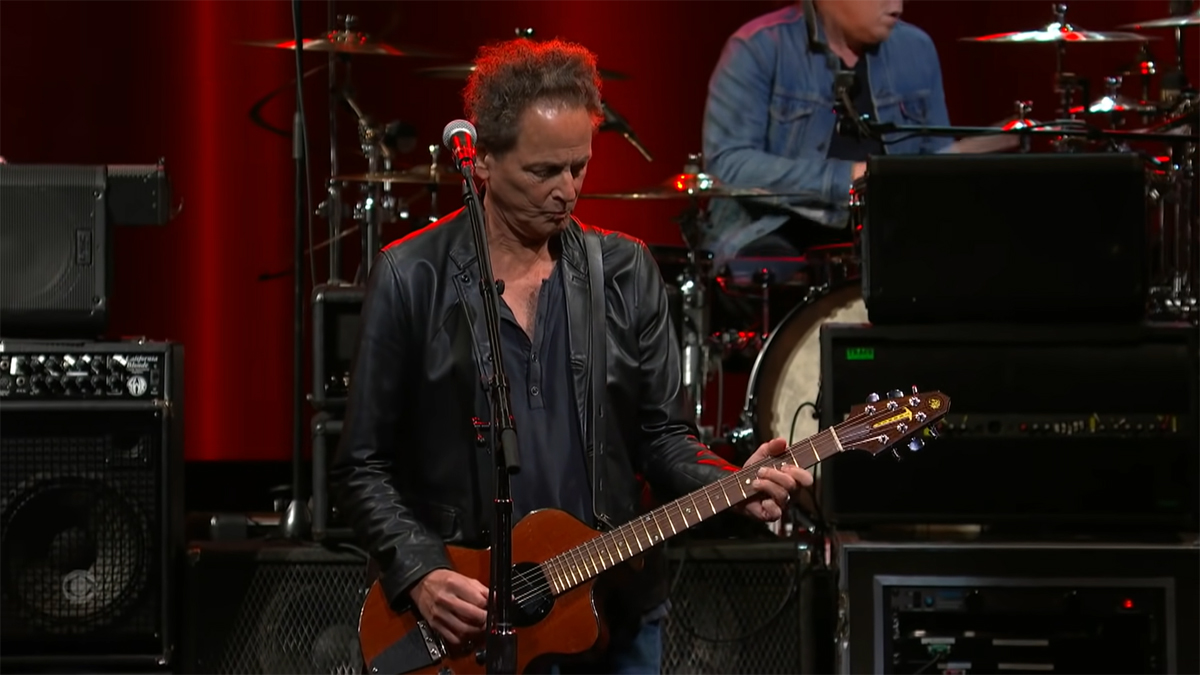Watch Lindsey Buckingham flex his fingerpicking solo skills in On the Wrong Side performance on The Late Show

After three singles and months of waiting, Lindsey Buckingham’s first solo album in 10 years was finally released last Friday (September 17), and the former Fleetwood Mac member celebrated the occasion with an appearance on The Late Show with Stephen Colbert.
Appearing on the show the day before the album dropped (September 16), Buckingham treated the audience to a solo-laden, harmony-heavy performance On The Wrong Side – the second single from the self-titled effort.
Wielding his trusty Rick Turner Model 1 LBU, Buckingham and his super-tight band breeze through the track’s soft rock exchanges, which are crammed with Fleetwood-esque, goosebump-inducing backing vocals and harmonies.
The highlight, however, is undoubtedly the melodic guitar solo. Initiating the 16-bar lead passage by stepping on a Boss DD-3 delay pedal and OD-1 overdrive pedal, the electric guitar icon effortlessly flexed his proficient powers of note selection, which he executed via his fierce fingerpicking skills.
On The Wrong side was the second of three pre-album releases, lining up alongside I Don’t Mind and Scream – all of which can be found on Lindsey Buckingham’s recently released self-titled studio album.
It’s Buckingham’s first solo effort since his 2011 offering, Seeds We Sow, with the 10-track record showcasing his “instinct for melody and his singular fingerpicking guitar style”.
“I wanted to make a pop album, but I also wanted to make stops along the way with songs that resemble art more than pop," Buckingham explained. “As you age, hopefully you keep getting a little more grounded in the craft of what you’re doing.
All the latest guitar news, interviews, lessons, reviews, deals and more, direct to your inbox!
"For me, getting older has probably helped to reinforce the innocence and idealism that hopefully was always there.”
As for On The Wrong Side, Buckingham revealed the track, which takes inspiration from Go Your Own Way, deals with the "peaks and valleys of life on the road with Fleetwood Mac".
In other Buckingham news, the rock icon recently clashed with former Fleetwood Mac bandmate Stevie Nicks, who called out the guitarist’s “factually inaccurate” recollection of his Fleetwood Mac departure, telling Rolling Stone, “To be exceedingly clear, I did not have him fired, I did not ask for him to be fired, I did not demand he be fired.”
- Lindsey Buckingham's self-titled album is available now.

Matt is the GuitarWorld.com News Editor, and has been writing and editing for the site for five years. He has a Masters in the guitar, a degree in history, and has spent the last 19 years playing everything from blues and jazz to indie and pop. During his GW career, he’s interviewed Peter Frampton, Zakk Wylde, Tosin Abasi, Matteo Mancuso and more, and has profiled the CEOs of Guitar Center and Fender.
When he’s not combining his passion for writing and music during his day job, Matt performs with indie rock duo Esme Emerson, and has previously opened for the likes of Ed Sheeran, Keane, Japanese House and Good Neighbours.
![B.B. King [left] cups his hands to his ear as he asks the crowd for more. Joe Bonamassa, with a Les Paul, gives his crowd a thumbs up](https://cdn.mos.cms.futurecdn.net/P3XrQLh86C27JfPp4AGp6n.jpg)